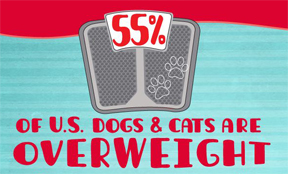 Is my pet overweight? We hear plenty in the news about the issue of obesity in America. But did you know that 55% of dogs and cats are overweight?
Is my pet overweight? We hear plenty in the news about the issue of obesity in America. But did you know that 55% of dogs and cats are overweight?
Risks
A pet weighing more than 10-20% of its optimal weight is at risk for:
- High blood pressure
- Ligament injury
- Heart and respiratory disease
- Increased risk of developing cancers of the mouth, skin, bones, and liver
- Type II Diabetes
- Osteoarthritis
- Kidney disease
Ultimately, overweight pets can have a decreased life expectancy of 2.5 years, which is equivalent to 38 human years!
Is my pet overweight?
Signs that your pet has packed on a few too many pounds:
- Difficult to feel ribs under fat
- Sagging stomach – you can grab a handful of fat
- Broad, flat back and now waist
How much should my pet weigh? Here are some general guidelines for popular breeds:
- German Shepherd: 75-95lbs
- Labrador Retriever: 65-80lbs
- Beagle: 18-30lbs
- Yorkshire Terrier: 7lbs or less
- Maine Coon Cat: 10-25lbs
- Persian Cat: 7-12lbs
- Domestic Breed Cat: 8-10lbs
Feeding
Many pets get 2 times the food they need, plus treats throughout the day. Follow these daily caloric needs for best portion control:
- 10lb dog: 200-275 calories or one bowl of food and one treat per day
- 10lb cat: 180-200 calories or one bowl of food and one treat per day
- 20lb dog: 325-400 calories or one bowl of food and two treats per day
- 50lb dog: 700-900 calories or two bowls of food and four treats per day
Exercise
We all need exercise on a daily basis and our pets are no different. Include your pet in your exercise routine and you’ll both be healthier for it!
For more information on healthy weight loss tips for your pet, visit http://www.petobesityprevention.com



